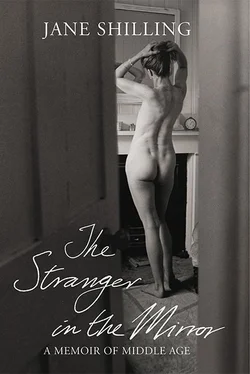Together with the comic horror of finding myself reincarnated as the lady with the fancy hat and the pinched expression, looking shifty at her daughter’s wedding in the advertisements for incontinence pads at the back of the newspaper colour supplements, there came that other cheerless metamorphosis: the vanishing of the features which I’d been accustomed for the past twenty-eight years to see gazing back at me when I glanced in the mirror, and their replacement with those of a stranger – haggard, bun-faced (the expanse from cheekbone to jawline somehow contriving to appear both hollow and doughy in consistency, as though if you poked it, the impression of your finger would remain in the flesh), the skin not fitting glossily over the features, but crinkling a little, as though it was no longer attached to the underlying tissue but beginning to separate from it.
At university I had bought in a junk shop a pair of very old, very soft, long kid gloves in palest ivory-pink. I had always loved the way the kid moulded itself over the hand when I wore them, stretching and wrinkling as the fingers flexed. But it was less entrancing, now, to see something similar happening on the surface of my face. Like the little old woman in the nursery rhyme, I felt like exclaiming, ‘Lawks a mercy on me/This is none of I!’
3
Because I’m Not Worth It
It was at this moment that the editor of the newspaper section for which I then wrote rang and suggested I have a facial. An American society dermatologist, a Dr Foster, who specialised in ‘non-surgical rejuvenation’, was setting up a practice in Mayfair.
Not only was this doctor apparently acknowledged by his peers in the field of skincare as the Derm’s Derm; he had even been immortalised in fiction. My editor had heard that he was the model for the dermatologist who smoothed the ravaged faces of the Park Avenue princesses in a recent work of chick lit about the New York gratin. His über-facial was said to take years off one’s phiz. So, did I want to go and see him?
I did. Facials had never been part of my regime. I thought they were a way for women with too much money and time to divest themselves of the superfluity. But that was before the stranger’s face began peering out of the mirror at me. If this Dr Foster could give me back my old face, restore the connection between my inner and outer self, I’d be happy to suspend my disbelief in the rejuvenating powers of calendula, grapeseed oil, micro-crystals, blasts of oxygen or anything else that he cared to apply to my skin.
I had recently read a short story by A.S. Byatt called ‘The Djinn in the Nightingale’s Eye’ in which the heroine, Dr Gillian Perholt, a scholar of narratology in her mid-fifties whose children are grown up and whose husband has left her for a woman of 26, suffers an attack of le réveil mortel . Speaking at a conference of narratologists in Turkey on ‘Stories of Women’s Lives’, Gillian Perholt has a vision, or hallucination, of a terrible hag, flat-breasted, ‘its withered skin… exposed about the emptiness, the windy hole that was its belly and womb’.
Later, in the bazaar in Istanbul, she finds a small dusty glass flask, dark blue, with a pattern of whirling white stripes – a pattern known as çeşm-i bülbül: nightingale’s eye. Rinsing the flask in the sink of her hotel bathroom, she accidentally loosens the stopper and from the flask there emerges a ‘fast-moving dark stain’ that resolves itself into an immense, greenish djinn.
Since she has released him, the djinn tells Gillian, he is required to grant her three wishes. Her profession has taught her all about the spiteful nature of wishing; of the tendency of wishes, when granted, to turn nasty, leaving the wisher at best disappointed, at worst chastened, undone by the rapacity of his own wanting.
‘“You must wish for your heart’s desire,”’ urges the djinn.’ And so, cautiously, she does. ‘“I wish,” said Gillian, “for my body to be as it was when I last really liked it…”’ An instant later, retreating into the bathroom, she sees in the mirror the reflection of ‘a solid and unexceptionable thirty-five-year-old woman’.
What the djinn has given her back is not the disturbing, dangerous beauty of her extreme youth, but a firmness both corporeal and spiritual. He has restored her to herself, banished the vision of the empty-bellied spectral hag. ‘That was an intelligent wish,’ thinks Gillian of her subtly altered appearance. ‘I shall not regret it.’
I thought of Gillian Perholt’s transformation while watching a television show called 10 Years Younger . Both story and TV show are haunted by the subtext that rages beneath all projects of self-rejuvenation. On whose behalf is the hopeful searcher for lost youth pursuing her quest? For the self who inhabits the ageing face and body, or for the people on the outside, looking on?
In 10 Years Younger , ordinary-looking middle-aged women (and a few men) who have won the privilege of participating submit to a pitiless scrutiny of their bodily flaws – missing and discoloured teeth, drooping breasts and bottoms, bad hair, cellulite, varicose veins, hammer toes, gnarled hands, pouched eyelids, drooping jowls, saggy necks, swags of surplus flesh – all the assorted afflictions of advancing age.
Then they are taken out, dressed like penitents in their unflattering everyday garments – shapeless old fleeces and baggy trousers – to the modern equivalent of the marketplace: the shopping mall or high street, where passers-by are urged to guess their age. The presenter and her subject watch a video of the process, at which the subject often weeps, before being consoled by the thought of the various procedures that can reverse the process into triumph.
The challenge is for the presenter and her team of djinns – a cosmetic surgeon, a dentist, a hairdresser and make-up artist – to reduce the initial public estimate (invariably higher than the woman’s actual age) to the appearance of an age at which, like Dr Perholt, the candidate for a makeover liked herself.
Trimmed, tidied, snipped, tightened, veneered, peeled, bleached, implanted, painted and re-dressed in clothes that are shorter, tighter, more vivid, more enticing than the dowdy camouflage in which they have been accustomed to shroud their imperfect bodies, the women are returned to the marketplace for the public vote, which invariably reduces by at least ten years the earlier public estimate of their age.
A premise, both of the story and the reality show, is the worthwhileness, the healing property for a woman of a certain age of even a temporary return to the appearance of a younger stage of life at which she felt comfortable in her skin. This is the programme’s sole objective. The format leaves no time to explore the narratives of the past, and certainly none for speculation about the shape of the future. The effect, when these occasionally burst into the triumphant present, is disconcerting.
‘Bet it’s a long time since you’ve seen your wife looking like that,’ chirps the presenter to a husband, rendered temporarily speechless by the sight of his wife’s metamorphosis from saggy hag to tucked and uplifted cutie. ‘I’ve never seen her looking like that,’ blurts the befuddled husband. There follows a beat of silence, during which the swarming resonances of his response hang in the air, the significance of what he has said beginning to register with presenter and TV audience alike. Then the camera averts its gaze, the moment passes and we shift to a safer shot of the cosmetically enhanced lady’s enthusiastic girlfriends exclaiming about the success of her new look.
The show’s format is too rigid to accommodate ambiguity – a quality in any case inimical to television. Sometimes the made-over women look doubtful, hesitant, as though startled to find themselves so different and the world around them still the same as they left it. They often seem, before the roar of approval from family and friends engulfs them, diffident about the granting of their wish to look younger, as though uncertain of how to inhabit their accustomed surroundings in their new guise.
Читать дальше












